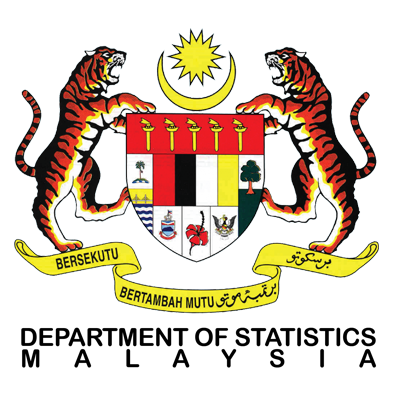Malaysia External Trade Statistics
- Home
- Statistics
- Economy
- External Sector
- Malaysia External Trade Statistics
Malaysia External Trade Statistics January 2019
Malaysia External Trade Statistics December 2018 4 January 2019
Malaysia External Trade Statistics November 2018 5 December 2018
Malaysia External Trade Statistics October 2018 5 November 2018
Malaysia External Trade Statistics September 2018 5 October 2018
Malaysia External Trade Statistics August 2018 5 February 2015
Malaysia External Trade Statistics December 2014 Show all release archives
Overview

KEY FACTS
- Malaysia’s exports in January 2019 posted a growth of 3.1% year-on-year (y-o-y) to RM85.4 billion. Re-exports was valued at RM17.5 billion (+0.4%) and accounted for 20.5% of total exports. Domestic exports increased RM2.5 billion or 3.9% to RM67.9 billion.
- Imports also grew 1.0% y-o-y to RM73.9 billion.
- On a month-on-month (m-o-m) basis, exports increased RM1.9 billion (+2.2%) from RM83.5 billion. In seasonally adjusted terms, exports registered an increase of 7.9%.
- On a m-o-m basis, imports posted a growth of RM1.0 billion (+1.4%) from RM72.9 billion. In seasonally adjusted terms, imports rose 2.6%.
- On a y-o-y basis, export growth was attributed to expansion in exports to China (+RM919.4 million), Thailand (+RM823.3 million), Republic of Korea (+RM775.0 million) and the United States (+RM680.8 million).
- On a y-o-y basis, higher imports were mainly from China (+RM2.7 billion), Saudi Arabia (+RM1.2 billion) and Taiwan (+RM696.0 million)
TRADE
Total trade in January 2019 grew 2.1% to reach RM159.3 billion from January 2018. It also posted a growth of 1.9% or RM2.9 billion when compared to the previous month. The trade surplus was RM11.5 billion, surged 19.2% or RM1.9 billion compared to the previous year. It also registered an increase of RM845.3 million (+7.9%) when compared to the previous month.
EXPORTS
On a y-o-y basis, exports increased 3.1% to RM85.4 billion. The main products which contributed to the increase were:
- Electrical and electronic (E&E) products (40.1% of total exports), increased RM2.6 billion or 8.2% to RM34.3 billion;
- Liquefied natural gas (LNG), which contributed 6.0% of total exports expanded RM1.4 billion or 37.5% to RM5.2 billion due to the increase in both average unit value (+18.3%) and export volume (+16.3%); and
- Timber and timber-based products, which accounted for 2.4% of total exports, grew RM92.7 million or 4.7% to RM2.1 billion.
However, declines were recorded for the following products:
- Refined petroleum products, which contributed 4.3% to total exports, declined RM1.6 billion or 29.9% to RM3.7 billion due to the decrease in both export volume (-29.1%) and average unit value (-1.2%);
- Palm oil and palm oil-based products (6.4% of total exports), shrank RM1.1 billion (-17.3%) to RM5.4 billion. Exports of palm oil, the major commodity in this group of products also decreased RM651.3 million or 16.6% due to the decrease in average unit value (-20.7%) as export volume increased 5.1%;
- Crude petroleum, which accounted for 2.9% of total exports decreased RM26.6 million or 1.1% to RM2.5 billion due to the decrease in average unit value (-4.6%) as export volume increased 3.7%; and
- Natural rubber (0.3% of total exports) decreased RM16.4 million or 5.6% to RM275.1 million due to the decline in average unit value (-11.0%) as export volume grew 6.1%.
On a m-o-m basis, exports grew 2.2% or RM1.9 billion from RM83.5 billion. The main products which contributed to the increase were:
- E&E products was higher by RM1.5 billion or 4.5% from RM32.8 billion;
- LNG, was up RM1.0 billion (+25.4%) from RM4.1 billion due to the higher export volume (+29.2%) as average unit value decreased 3.0%;
- Palm oil and palm oil-based products increased RM620.9 million or 12.9% from RM4.8 billion. Exports of palm oil expanded RM627.5 million or 23.8% due to the increase in export volume (+28.4%) as average unit value decreased 3.6%;
- Timber and timber-based products increased RM236.7 million or 12.8% from RM1.8 billion; and
- Natural rubber rose marginal RM3.3 million or 1.2% from RM271.8 million due to the higher export volume (+3.3%) as average unit value decreased 2.1%.
However, decreases were recorded for the following products:
- Refined petroleum products, dropped RM869.3 million or 19.1% from RM4.6 billion due to the decrease in both export volume (-13.2%) and average unit value (-6.8%); and
- Crude petroleum declined RM830.8 million or 25.2% from RM3.3 billion due to the decrease in both export volume (-16.8%) and average unit value (-10.1%).
Exports to Country of Destination
The two major destinations for Malaysia's exports in January 2019 were Singapore and China. Exports to Singapore amounted to RM12.2 billion increased RM627.0 million (+5.4%) as compared to the previous year.
The main products which contributed to the increase were:
- Electrical and electronic products (48.8% of total exports), increased RM1.0 billion or 20.6% to RM5.9 billion; and
- Crude petroleum which contributed 4.1% of total exports grew RM171.8 million or 52.3% to RM500.3 million.
However, declines were recorded for the following products:
- Refined petroleum products, which contributed 7.7% to total exports, declined RM782.3 million or 45.6% to RM934.9 million; and
- Palm oil and palm oil-based products (1.6% of total exports), shrank by RM73.4 million (-27.9%) to RM189.8 million.
Meanwhile, exports to China increased RM919.4 million (+9.1%) were valued at RM11.0 billion.
The main products which contributed to the increase were:
- Liquefied natural gas (LNG) (10.5% of total exports), increased RM809.3 million or 233.5% to RM1.2 billion;
- Polymer of ethylene, in primary forms which contributed 4.5% of total exports grew RM283.9 million or 136.7% to RM491.6 million; and
- Refined petroleum products which contributed 3.5% of total exports grew RM257.1 million or 197.2% to RM387.5 million.
However, declines were recorded for electrical & electronic products (35.7% of total exports), shrank by RM633.1 million (-13.8%) to RM3.9 billion.
Seasonally Adjusted Figure
On a m-o-m basis seasonally adjusted terms, exports grew RM6.4 billion (+7.9%) to RM87.2 billion.
Exports, 2015-2019

IMPORTS
On a y-o-y basis, imports rose marginal 1.0% to RM73.9 billion. The increase in imports was attributed to consumption goods.
- Consumption Good
Imports of consumption goods which accounted for 8.8% of total imports recorded an increase of RM208.9 million (+3.3%) to RM6.5 billion. The increase was mainly attributed to non-durables (+RM188.8 million, +13.5%) and durables (+RM120.7 million, +16.4%).
- Capital Goods
Imports of capital goods, which contributed 12.2% to total imports, declined RM308.2 million or 3.3% to RM9.0 billion due to the decrease in transport equipment, industrial (-RM465.1 million, -50.2%). However, capital good (except transport equipment) increased RM156.9 million or 1.9%.
- Intermediate Goods
These goods which constituted 50.7% of total imports decreased RM283.7 million (-0.8%) to RM37.5 billion. The decrease was mainly attributed to parts & accessories of capital goods (except transport equipment) (-RM1.6 billion, -14.5%) and fuel & lubricants processed, others (-RM821.4 million, -45.2%). On the other hand, industrial supplies, processed and fuel & lubricants, primary increased RM1.0 billion (+6.3%) and RM927.7 million (+36.7%) respectively.
On a m-o-m basis, imports increased RM1.0 billion or 1.4% from RM72.9 billion.
- Consumption Goods
Imports of consumption goods decreased RM62.8 million (-1.0%) fromRM6.6 billion. The decrease was due to food & beverages, processed, mainly for household consumption (-RM336.9 million, -16.8%). On the other hand, food & beverages, primary, mainly for household consumption increased RM183.4 million or 22.3%.
- Capital Goods
Imports of capital goods shrank RM467.9 million or 5.0% from RM9.5 billion due to the decrease in both transport equipment, industrial (-RM382.2 million, -45.3%) and capital goods (except transport equipment) (-RM85.7 million, -1.0%).
- Intermediate Goods
These goods fell RM2.0 billion (-5.0%) from RM39.4 billion. The main component attributing to the decrease was parts & accessories of capital good (except transport equipment) (-RM3.0 billion, -24.5%). However, industrial supplies, processed registered an increase of RM1.3 billion or 7.8%.
Imports by Country of Origin
The two main sources of Malaysia’s import in January 2019 were China and Singapore. Imports from China amounted to RM17.9 billion increased RM2.7 billion (+17.5%) as compared to the previous year.
The main products which contributed to the increase were:
- Refined petroleum products (8.8% of total imports), increased RM881.3 million or 128.7% to RM1.6 billion;
- Electrical & electronic products, which contributed 32.3% of total imports grew RM283.9 million or 5.2% to RM5.8 billion; and
- Motor cars and other motor vehicles for passengers, which accounted for 1.5% of total imports, grew RM258.6 million to RM262.3 million.
Imports from Singapore decreased RM1.5 billion (-16.4%) as compared to the previous year to record RM7.6 billion.
The main products which contributed to the decrease were:
- Refined petroleum products (27.5% of total imports), decreased RM1.2 billion or 37.4% to RM2.1 billion;
- Electrical & electronic products, which contributed 35.1% of total imports, shrank RM293.1 million or 9.9% to RM2.7 billion.
Seasonally Adjusted Figure
On a m-o-m basis seasonally adjusted terms, imports increased RM1.8 billion (+2.6%) to RM73.2 billion.
Imports, 2015-2019

MARKET SHARE
The following charts show Malaysia's major trading partners for January 2019.
Total Trade by Major Countries, Jan 2019, percentage share

Exports and Imports by Major Countries, Jan 2019, percentage share

The following charts show Malaysia’s trade with ASEAN countries for January 2019.
Exports, Jan 2019, percentage share

Imports, Jan 2019, percentage share

#Notes:
1. The January 2019 data is provisional and subject to revision in later issues.
2. This report can be accessed through the web portal of the Department of Statistics, Malaysia (https://www.dosm.gov.my) under section: Latest Release.
Released By:
DATO' SRI DR. MOHD UZIR MAHIDIN
CHIEF STATISTICIAN MALAYSIA
DEPARTMENT OF STATISTICS, MALAYSIA
![]() DrUzir_Mahidin
DrUzir_Mahidin ![]()
![]() Dr_Uzir
Dr_Uzir
4 MARCH 2019
Contact person:
Ho Mei Kei
Public Relation Officer
Strategic Communication and International Division
Department of Statistics, Malaysia
Tel : +603-8885 7942
Fax : +603-8888 9248
Email : mkho[at]dosm.gov.my
Subscribe
Newsletter
Subscribe to our newsletter and stay updated
For interviews, press statement and clarification to the media, contact:
Baharudin Mohamad
Public Relation Officer
Email: baharudin[at]dosm.gov.my
Phone: 03 8090 4681
Not found what you looking for? Request data from us, through
Go to eStatistik
Email: data[at]dosm.gov.my
Phone: 03 8885 7128 (data request)










